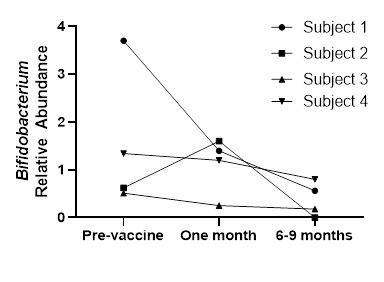Back
Poster Session E - Tuesday Afternoon
E0141 - Persistent Damage to the Gut Microbiome Following Messenger RNA SARS-CoV-2 Vaccine
Tuesday, October 25, 2022
3:00 PM – 5:00 PM ET
Location: Crown Ballroom

Sabine Hazan, MD
ProgenaBiome, LLC
VENTURA, CA
Presenting Author(s)
Sabine Hazan, MD1, Sonya Dave, PhD2, Brad Barrows, DO1, Thomas J. Borody, MD, PhD, DSc, FACG3
1ProgenaBiome, LLC, Ventura, CA; 2North End Advisory, Smyrna, GA; 3Centre for Digestive Diseases, Five Dock, New South Wales, Australia
Introduction: Messenger RNA vaccines for SARS-CoV-2 are widely distributed, yet their effect on the human gut microbiome, especially long-term up to one year, is unknown. The human gut microbiome is an essential determinant of human health. Genus bifidobacteria decline is associated with inflammatory bowel disease, obesity, neurological disorders, C. diffícile infection and severe COVID-19 (1,2,3).
Case Description/Methods: We longitudinally recorded the relative abundance of genus bifidobacteria in four subjects before receiving mRNA vaccine (Pfizer or Moderna), approximately one month after vaccine, and 6 to 9 months later. Additional SARS-CoV-2 vaccines were given during that period, totaling 2 to 3 doses. Samples were collected at the timepoints mentioned. There were no diet changes or new medication’s during the entire period and subjects were told to stay on the same regimen throughout the six months.
Metagenomic next generation sequencing-based methods were applied to samples obtained from fecal collection. DNA was extracted, and the library prepped, enriched and sequenced on an Illumina Nextseq 550 system.
Relative abundance of bifidobacteria decreased after one month to in 3 of 4 subjects to: 38%, 258%, 49% and 90% of pre-vaccine levels. After 6-9 months, all bifidobacteria relative abundance decreased to: 15%, 0%, 35%, and 60% of pre-vaccine levels.
This study is IRB approved.
Discussion: This is the first study to demonstrate a decrease in relative abundance of genus bifidobacteria 6-9 months after SARS-CoV-2 vaccination. All subjects dropped below a 1% relative abundance. Although a small sample, these findings may suggest a potential mechanism for post-vaccination complications; however, no subjects in the study demonstrated significant complications. Gut dysbiosis post mRNA SARS-CoV-2 vaccines could potentially be a future indication for restoration of bifidobacteria either orally or directly via fecal transplant.
References:
< !1. Ruiz L, et al. Bifidobacteria and Their Molecular Communication with the Immune System. Front Microbiol. 2017
< !2. Suganya K, Koo BS. Gut-Brain Axis: Role of Gut Microbiota on Neurological Disorders and How Probiotics/Prebiotics Beneficially Modulate Microbial and Immune Pathways to Improve Brain Functions. Int J Mol Sci. 2020 f !supportLists]
3. Hazan S, et al. Lost microbes of COVID-19: Bifidobacterium, Faecalibacterium depletion and decreased microbiome diversity associated with SARS-CoV-2 infection severity. BMJ Open Gastro. 2022

Disclosures:
Sabine Hazan, MD1, Sonya Dave, PhD2, Brad Barrows, DO1, Thomas J. Borody, MD, PhD, DSc, FACG3. E0141 - Persistent Damage to the Gut Microbiome Following Messenger RNA SARS-CoV-2 Vaccine, ACG 2022 Annual Scientific Meeting Abstracts. Charlotte, NC: American College of Gastroenterology.
1ProgenaBiome, LLC, Ventura, CA; 2North End Advisory, Smyrna, GA; 3Centre for Digestive Diseases, Five Dock, New South Wales, Australia
Introduction: Messenger RNA vaccines for SARS-CoV-2 are widely distributed, yet their effect on the human gut microbiome, especially long-term up to one year, is unknown. The human gut microbiome is an essential determinant of human health. Genus bifidobacteria decline is associated with inflammatory bowel disease, obesity, neurological disorders, C. diffícile infection and severe COVID-19 (1,2,3).
Case Description/Methods: We longitudinally recorded the relative abundance of genus bifidobacteria in four subjects before receiving mRNA vaccine (Pfizer or Moderna), approximately one month after vaccine, and 6 to 9 months later. Additional SARS-CoV-2 vaccines were given during that period, totaling 2 to 3 doses. Samples were collected at the timepoints mentioned. There were no diet changes or new medication’s during the entire period and subjects were told to stay on the same regimen throughout the six months.
Metagenomic next generation sequencing-based methods were applied to samples obtained from fecal collection. DNA was extracted, and the library prepped, enriched and sequenced on an Illumina Nextseq 550 system.
Relative abundance of bifidobacteria decreased after one month to in 3 of 4 subjects to: 38%, 258%, 49% and 90% of pre-vaccine levels. After 6-9 months, all bifidobacteria relative abundance decreased to: 15%, 0%, 35%, and 60% of pre-vaccine levels.
This study is IRB approved.
Discussion: This is the first study to demonstrate a decrease in relative abundance of genus bifidobacteria 6-9 months after SARS-CoV-2 vaccination. All subjects dropped below a 1% relative abundance. Although a small sample, these findings may suggest a potential mechanism for post-vaccination complications; however, no subjects in the study demonstrated significant complications. Gut dysbiosis post mRNA SARS-CoV-2 vaccines could potentially be a future indication for restoration of bifidobacteria either orally or directly via fecal transplant.
References:
< !1. Ruiz L, et al. Bifidobacteria and Their Molecular Communication with the Immune System. Front Microbiol. 2017
< !2. Suganya K, Koo BS. Gut-Brain Axis: Role of Gut Microbiota on Neurological Disorders and How Probiotics/Prebiotics Beneficially Modulate Microbial and Immune Pathways to Improve Brain Functions. Int J Mol Sci. 2020 f !supportLists]
3. Hazan S, et al. Lost microbes of COVID-19: Bifidobacterium, Faecalibacterium depletion and decreased microbiome diversity associated with SARS-CoV-2 infection severity. BMJ Open Gastro. 2022

Figure: Figure 1: Bifidobacteria relative abundance demonstrates a lasting decline after SARS-CoV-2 mRNA vaccination.
Disclosures:
Sabine Hazan indicated no relevant financial relationships.
Sonya Dave: McKesson Specialty Health / Ontada – Employee.
Brad Barrows indicated no relevant financial relationships.
Thomas Borody: Axent medical Pty. Ltd – Advisory Committee/Board Member. Centre for Digestive Diseases – Advisory Committee/Board Member, Consultant, Employee, Grant/Research Support, Intellectual Property/Patents, Ownership interest, Owner/Ownership Interest, Stock-privately held company. Finch Therapeutics – Advisory Committee/Board Member, Intellectual Property/Patents, Stock-publicly held company(excluding mutual/index funds). Topelia Therapeutics – Advisor or Review Panel Member, Intellectual Property/Patents.
Sabine Hazan, MD1, Sonya Dave, PhD2, Brad Barrows, DO1, Thomas J. Borody, MD, PhD, DSc, FACG3. E0141 - Persistent Damage to the Gut Microbiome Following Messenger RNA SARS-CoV-2 Vaccine, ACG 2022 Annual Scientific Meeting Abstracts. Charlotte, NC: American College of Gastroenterology.
